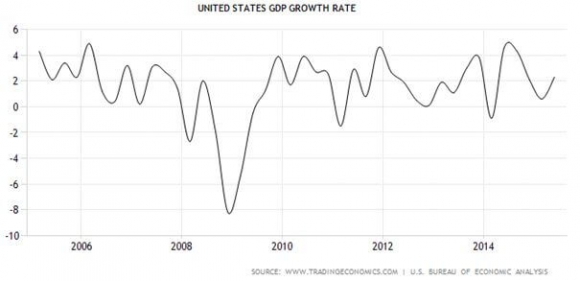Why the ?Underground? Economy is Growing
There is no doubt that the ?underground? economy is growing.
No, I?m not talking about violent crime, drug dealing, or prostitution. Those are largely driven by demographics, which right now, are at a low ebb.
I?m referring to the portion of the economy that the government can?t see, and therefore is not counted in its daily data releases.
This is a big problem.
Most investors rely on economic data to dictate their trading strategies. When the data is strong, they aggressively buy stocks, assuming that a healthy economy will boost corporate profits.
When data is weak, we get the flip side, and investors bail on equities. They also sell commodities, precious metals, oil, and plow their spare cash into the bond market.
We are now more than half way through a decade that has delivered unrelentingly low annual GDP growth, around the 2%-2.5% level.
We all know the reasons. Retiring baby boomers, some 85 million of them, are a huge drag on the system, as they save, and don?t spend.
Generation X-ers do spend, but there are only 65 million of them. And many Millennials are still living in their parents? basements - broke and unable to land paying jobs in this ultra cost conscious world.
But what if these numbers were wrong? What if the Feds were missing a big part of the picture?
I believe this is in fact what is happening.
I think the economy is now evolving so fast, thanks to the simultaneous hyper acceleration of multiple new technologies, that the government is unable to keep up.
Further complicating matters is the fact that many new internet services are FREE, and therefore are invisible to government statisticians.
They are, in effect, reading from a playbook that is a decade or more old.
What if the economy was really growing at a 3-4% pace, but we just didn?t know it.
I?ll give you a good example.
The government?s Consumer Price Index is a basket of hundreds of different prices for the things we buy. But the Index rarely changes, while we do.
The figure the Index uses for Internet connections hasn?t changed in ten years.
Gee, do you think that the price of broadband has risen in a decade, with the 1,000-fold increase in speeds?
In the early 2,000?s you could barely watch a snippet of video on YouTube without your computer freezing up. Now, I can download a two-hour movie in High Definition in just two minutes on my Comcast 250 megabyte per second business line.
And many people now watch movies on their iPhones. I see them in the rush hour traffic.
I?ll give you another example of the burgeoning black economy: Me.
My business shows up nowhere in the government economic data because it is entirely online. No bricks and mortar here!
Yet, I employ a dozen people, provide services to thousands of individuals, institutions, and governments in 140 countries, and take in millions of dollars in revenues in the process.
I pay a lot of American taxes too.
How many more me's are out there? I would bet millions.
If the government were understating the strength of the economy, what would the stock market look like?
It would keep going up every year like clockwork, as ever-rising profits feed into stronger share prices.
But multiples would never get very high (now at 19 times earnings) because no one believed in the rally, since the economic data was so weak.
That would leave them constantly underweight equities in a bull market.
Stocks would miraculously and eternally climb a wall of worry. Did I mention that the S$P 500 is 2% short of an all time high?
?
On the other hand, bonds would remain strong as well, and interest rates low, because so many individuals and corporations were plowing excess, unexpected profits into fixed income securities. Structural deflation would also give them a big tailwind.
If any of this sounds familiar, please raise your hand.
I have been analyzing economic data for a half century, so I am used to government statistics being incorrect.
It was a particular problem in emerging economies, like Japan and China, which were just getting a handle on what comprised their economies for the first time.
But to make this claim about the United States government, that has been counting things for 225 years, is a bit like saying the emperor has no clothes.
Sure, there has always been a lag between the government numbers and reality. In the old days they used horses to collect data, and during the Great Depression numbers were kept on 3? X 5? index cards filled out with fountain pens.
But today, the disconnect is greater than it ever has been, by a large margin, thanks to technology.
Is this unbelievable? Yes, but you better get used to it.
As for that bull market in stocks, it just might keep on going.





